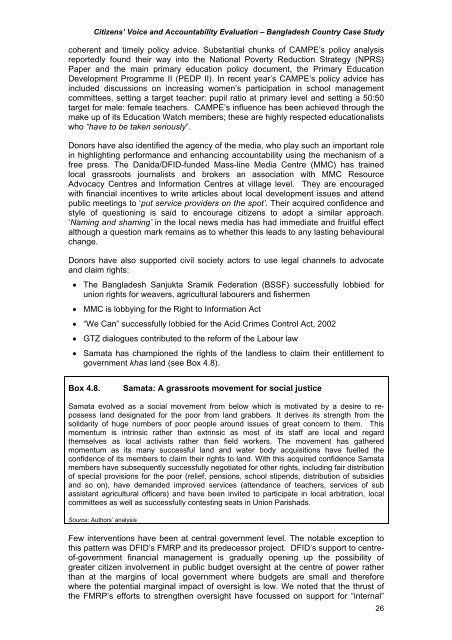Bangladesh - Belgium
Bangladesh - Belgium
Bangladesh - Belgium
Create successful ePaper yourself
Turn your PDF publications into a flip-book with our unique Google optimized e-Paper software.
Citizens’ Voice and Accountability Evaluation – <strong>Bangladesh</strong> Country Case Study<br />
coherent and timely policy advice. Substantial chunks of CAMPE’s policy analysis<br />
reportedly found their way into the National Poverty Reduction Strategy (NPRS)<br />
Paper and the main primary education policy document, the Primary Education<br />
Development Programme II (PEDP II). In recent year’s CAMPE’s policy advice has<br />
included discussions on increasing women’s participation in school management<br />
committees, setting a target teacher: pupil ratio at primary level and setting a 50:50<br />
target for male: female teachers. CAMPE’s influence has been achieved through the<br />
make up of its Education Watch members; these are highly respected educationalists<br />
who “have to be taken seriously”.<br />
Donors have also identified the agency of the media, who play such an important role<br />
in highlighting performance and enhancing accountability using the mechanism of a<br />
free press. The Danida/DFID-funded Mass-line Media Centre (MMC) has trained<br />
local grassroots journalists and brokers an association with MMC Resource<br />
Advocacy Centres and Information Centres at village level. They are encouraged<br />
with financial incentives to write articles about local development issues and attend<br />
public meetings to ‘put service providers on the spot’. Their acquired confidence and<br />
style of questioning is said to encourage citizens to adopt a similar approach.<br />
‘Naming and shaming’ in the local news media has had immediate and fruitful effect<br />
although a question mark remains as to whether this leads to any lasting behavioural<br />
change.<br />
Donors have also supported civil society actors to use legal channels to advocate<br />
and claim rights:<br />
• The <strong>Bangladesh</strong> Sanjukta Sramik Federation (BSSF) successfully lobbied for<br />
union rights for weavers, agricultural labourers and fishermen<br />
• MMC is lobbying for the Right to Information Act<br />
• “We Can” successfully lobbied for the Acid Crimes Control Act, 2002<br />
• GTZ dialogues contributed to the reform of the Labour law<br />
• Samata has championed the rights of the landless to claim their entitlement to<br />
government khas land (see Box 4.8).<br />
Box 4.8.<br />
Samata: A grassroots movement for social justice<br />
Samata evolved as a social movement from below which is motivated by a desire to repossess<br />
land designated for the poor from land grabbers. It derives its strength from the<br />
solidarity of huge numbers of poor people around issues of great concern to them. This<br />
momentum is intrinsic rather than extrinsic as most of its staff are local and regard<br />
themselves as local activists rather than field workers. The movement has gathered<br />
momentum as its many successful land and water body acquisitions have fuelled the<br />
confidence of its members to claim their rights to land. With this acquired confidence Samata<br />
members have subsequently successfully negotiated for other rights, including fair distribution<br />
of special provisions for the poor (relief, pensions, school stipends, distribution of subsidies<br />
and so on), have demanded improved services (attendance of teachers, services of sub<br />
assistant agricultural officers) and have been invited to participate in local arbitration, local<br />
committees as well as successfully contesting seats in Union Parishads.<br />
Source: Authors’ analysis<br />
Few interventions have been at central government level. The notable exception to<br />
this pattern was DFID’s FMRP and its predecessor project. DFID’s support to centreof-government<br />
financial management is gradually opening up the possibility of<br />
greater citizen involvement in public budget oversight at the centre of power rather<br />
than at the margins of local government where budgets are small and therefore<br />
where the potential marginal impact of oversight is low. We noted that the thrust of<br />
the FMRP’s efforts to strengthen oversight have focussed on support for “internal”<br />
26

















